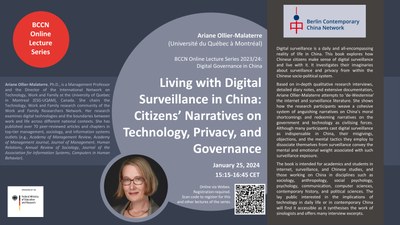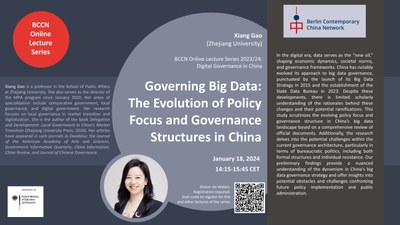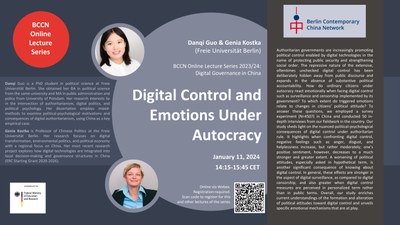Neuigkeiten
29.04.2024 BCCN Book-Talk "Die Zukunft mit China denken"
- https://www.iaaw.hu-berlin.de/de/ostasien/neuigkeiten/aktuelle-termine/29-04-2024-bccn-book-talk-die-zukunft-mit-china-denken
- 29.04.2024 BCCN Book-Talk "Die Zukunft mit China denken"
- 2024-04-29T18:30:00+02:00
- 2024-04-29T20:00:00+02:00
- Wann 29.04.2024 von 18:30 bis 20:00
- Wo IAAW, Invalidenstraße 118, Raum 315
- Name des Kontakts Dr. Daniel Fuchs
- Web Externe Webseite besuchen
-
iCal
Liebe Kolleg:innen,
wir möchten Sie herzlich zur Podiumsdiskussion anlässlich des kürzlich erschienenen Buchs "Die Zukunft mit China Denken" (Mandelbaum, 2023) am 29. April 2024 einladen. Nach einer Vorstellung der zentralen, im Sammelband versammelten Argumente diskutieren Herausgeber:innen und Autor:innen die Frage, welche Herausforderungen es in der wissenschaftlichen und gesellschaftlichen Auseinandersetzung mit China zu bewältigen gilt, und welche Kompetenzen hierfür notwendig sind.
Mit: Prof. Dr. Susanne Weigelin-Schwiedrzik, Prof. Dr. Felix Wemheuer, Prof. Dr. Mechthild Leutner & Dr. Daniel Fuchs
Moderation: Felix Lee (China.Table)
Zeit: 29. April 2024, 18:30 Uhr - 20:00 Uhr
Ort: Humboldt-Universität zu Berlin, Institut für Asien- und Afrikawissenschaften, Raum 315, Invalidenstrasse 118, 10115 Berlin
Weitere Informationen zu diesem BCCN Book Talk: https://berlincontemporarychinanetwork.org/events/detail/die-zukunft-mit-china-denken-thinking-the-future-with-china-book-presentation-and-discussion
Zum Sammelband "Die Zukunft mit China denken"
Der Aufstieg Chinas und seine Auswirkungen prägen Gegenwart und Zukunft unseres Planeten. Die unterschiedlichen Zukunftsvisionen in der chinesischen Gesellschaft wurden bisher jedoch kaum rezipiert. Der Band »Die Zukunft mit China denken« versammelt international renommierte China-Wissenschafter:innen mit dem Ziel, diese Lücke zu schließen. Die Autor:innen bieten kritische Analysen und historische Einordnungen chinesischer Zukunftsentwürfe. Die Debatten um die Zukunft des politischen und wirtschaftlichen »Modells China«, der chinesischen Umwelt-, Klima- und Migrationspolitik sowie der geopolitischen Rolle in einer neuen Weltordnung werden untersucht. Darüber hinaus analysiert der Band Zukunftsvisionen in der Literatur, der chinesischen Diaspora und den China-Studien. Siehe: https://www.mandelbaum.at/buecher/daniel-fuchs-sascha-klotzbuecher-andrea-riemenschnitter-lena-springer-felix-wemheuer/die-zukunft-mit-china-denken/
Zu den Vortragenden:
Susanne Weigelin-Schwiedrzik ist emeritierte Professorin am Institut für Ostasienwissenschaften der Universität Wien. Ihre Forschungsschwerpunkte die Geschichte Chinas und Ostasiens im 19. Und 20. Jahrhundert, sowie die zeitgenössische Politik und Außenpolitik der Volksrepublik China.
Felix Wemheuer ist Professor für Moderne China-Studien an der Universität zu Köln. Sein Forschungsschwerpunkt liegt auf der Sozialgeschichte Chinas des 20. Jahrhunderts, insbesondere mit Hinblick auf das ländliche China, Klassen- und Geschlechterverhältnisse sowie ethnische Minderheiten.
Mechthild Leutner ist emeritierte Professorin für Staat, Gesellschaft und Kultur des modernen China an der Freien Universität Berlin. Ihre Forschung konzentriert sich auf die die Neuere Geschichte Chinas, die deutsch-chinesischen Beziehungen sowie die Geschichte der Sinologie.
Daniel Fuchs ist wissenschaftlicher Mitarbeiter am Institut für Asien- und Afrikawissenschaften der Humboldt-Universität zu Berlin. Er forscht und lehrt zu Arbeitsbeziehungen, Migration, sozialen Protesten und Industriepolitik in der VR China.
Wir freuen uns auf Ihre Teilnahme!
Herzliche Grüße,
Daniel Fuchs
29.01.2024 BCCN Webinar "Geopolitics of ICT standardisation"
- https://www.iaaw.hu-berlin.de/de/ostasien/neuigkeiten/aktuelle-termine/29-01-2024-bccn-the-standict-eu-academy-webinar-geopolitics-of-ict-standardisation
- 29.01.2024 BCCN Webinar "Geopolitics of ICT standardisation"
- 2024-01-29T16:00:00+01:00
- 2024-01-29T18:00:00+01:00
- Wann 29.01.2024 von 16:00 bis 18:00
- Wo webinar
- Name des Kontakts Dr. Daniel Fuchs
- Web Externe Webseite besuchen
-
iCal
The StandICT.eu Academy is glad to invite you to the upcoming webinar organised in cooperation with the Berlin Contemporary China Network.
During the event, to be held on 29th January 2024 from 16:00 to 18:00 CET, we will delve into the intricate world of ICT standardisation and its geopolitical implications, starting with a comprehensive exploration of technological sovereignty and the evolving roles of key global players in shaping the landscape of international standards.
Our speakers will guide us through various facets of ICT standardisation. From the geopolitics surrounding Open Radio Access Network (RAN) to China's changing influence in global standard-setting, this webinar offers a valuable opportunity to gain insights into the power dynamics and cooperation within the realm of international ICT standards.
Draft Agenda
- Intro into standardisation and geopolitcs with a focus on technological sovereignty,
Knut Blind (Fraunhofer ISI & TU Berlin)
- The Geopolitics of ICT standardisation: The Case of Open RAN,
Heejin Lee (Graduate School of International Studies, Yonsei University, Republic of Korea)
- The power of standardisation,
Dirk Weiler (Nokia Head of Standards Policy)
- Cooperation and contestation: China's evolving role in international standardisation,
Daniel Fuchs (HU Berlin, BCCN)
For more information, please visit StandICT.eu
25.01.2024 BCCN Lecture:"Living with Digital Surveillance in China: Citizens’ Narratives on Technology, Privacy, and Governance"
- https://www.iaaw.hu-berlin.de/de/ostasien/neuigkeiten/aktuelle-termine/25-01-2024-bccn-lecture-living-with-digital-surveillance-in-china-citizens2019-narratives-on-technology-privacy-and-governance
- 25.01.2024 BCCN Lecture:"Living with Digital Surveillance in China: Citizens’ Narratives on Technology, Privacy, and Governance"
- 2024-01-25T15:15:00+01:00
- 2024-01-25T16:45:00+01:00
- Wann 25.01.2024 von 15:15 bis 16:45
- Wo Online
- Name des Kontakts Sarah Eaton
-
iCal
We cordially invite you to lecture #6 of the BCCN Lecture Series "Digital Governance in China“:
Living with Digital Surveillance in China: Citizens’ Narratives on Technology, Privacy, and Governance
By Ariane Ollier-Malaterre (Université du Québec à Montréal)
January 25, 2024, 15:15 - 16:45 CET
Please register here: https://fu-berlin.webex.com/webappng/sites/fu-berlin/webinar/webinarSeries/register/8df470e12e264f959533abfdd58bd646
Abstract
Digital surveillance is a daily and all-encompassing reality of life in China. This book explores how Chinese citizens make sense of digital surveillance and live with it. It investigates their imaginaries about surveillance and privacy from within the Chinese socio-political system.
Based on in-depth qualitative research interviews, detailed diary notes, and extensive documentation, Ariane Ollier-Malaterre attempts to ‘de-Westernise’ the internet and surveillance literature. She shows how the research participants weave a cohesive system of anguishing narratives on China’s moral shortcomings and redeeming narratives on the government and technology as civilising forces. Although many participants cast digital surveillance as indispensable in China, their misgivings, objections, and the mental tactics they employ to dissociate themselves from surveillance convey the mental and emotional weight associated with such surveillance exposure.
The book is intended for academics and students in internet, surveillance, and Chinese studies, and those working on China in disciplines such as sociology, anthropology, social psychology, psychology, communication, computer sciences, contemporary history, and political sciences. The lay public interested in the implications of technology in daily life or in contemporary China will find it accessible as it synthesises the work of sinologists and offers many interview excerpts.
Bio
Ariane Ollier-Malaterre, Ph.D., is a Management Professor and the Director of the International Network on Technology, Work and Family at the University of Quebec in Montreal (ESG-UQAM), Canada. She chairs the Technology, Work and Family research community of the Work and Family Researchers Network. Her research examines digital technologies and the boundaries between work and life across different national contexts. She has published over 70 peer-reviewed articles and chapters in top-tier management, sociology, and information systems outlets (e.g., Academy of Management Review, Academy of Management Journal, Journal of Management, Human Relations, Annual Review of Sociology, Journal of the Association for Information Systems, Computers in Human Behavior).
For more information of the overall lecture series please take a look at our Website.
Sincerely,
Your BCCN Team
18.01.2024 BCCN Lecture: "Governing Big Data: The Evolution of Policy Focus and Governance Structures in China"
- https://www.iaaw.hu-berlin.de/de/ostasien/neuigkeiten/aktuelle-termine/18-01-2024-bccn-lecture-governing-big-data-the-evolution-of-policy-focus-and-governance-structures-in-china
- 18.01.2024 BCCN Lecture: "Governing Big Data: The Evolution of Policy Focus and Governance Structures in China"
- 2024-01-18T14:15:00+01:00
- 2024-01-18T15:45:00+01:00
- Wann 18.01.2024 von 14:15 bis 15:45
- Wo Online
- Name des Kontakts Sarah Eaton
-
iCal
We cordially invite you to participate in lecture #5 of the BCCN Lecture Series "Digital Governance in China“:
Governing Big Data: The Evolution of Policy Focus and Governance Structures in China
By Xiang Gao (Zhejiang University)
January 18, 2024, 14:15 - 15:45 CET
Please register here: https://fu-berlin.webex.com/webappng/sites/fu-berlin/webinar/webinarSeries/register/8df470e12e264f959533abfdd58bd646
Abstract
In the digital era, data serves as the “new oil,” shaping economic dynamics, societal norms, and governance frameworks. China has notably evolved its approach to big data governance, punctuated by the launch of its Big Data Strategy in 2015 and the establishment of the State Data Bureau in 2023. Despite these developments, there is limited scholarly understanding of the rationales behind these changes and their potential ramifications. This study scrutinizes the evolving policy focus and governance structure in China’s big data landscape based on a comprehensive review of official documents. Additionally, the research delves into the potential challenges within the current governance architecture, particularly in terms of bureaucratic politics, including both formal structures and individual resistance. Our preliminary findings provide a nuanced understanding of the dynamism in China's big data governance strategy and offer insights into potential obstacles and challenges confronting future policy implementation and public administration.
Bio
Dr. Xiang Gao is a professor in the School of Public Affairs at Zhejiang University. She also serves as the director of the MPA program since January 2020. Her areas of specialization include comparative government, local governance, and digital government. Her research focuses on local governance in market transition and digitalization. She is the author of the book Delegation and Development: Local Government in China’s Market Transition (Zhejiang University Press, 2020). Her articles have appeared in such journals as Daedalus: the Journal of the American Academy of Arts and Sciences, Government Information Quarterly, China Information, China Review, and Journal of Chinese Governance.
For more information of the overall lecture series please take a look at our Website.
Sincerely,
Your BCCN Team
11.01.2024 BCCN Lecture:"Digital Control and Emotions Under Autocracy"
- https://www.iaaw.hu-berlin.de/de/ostasien/neuigkeiten/aktuelle-termine/11-01-2024-bccn-lecture-digital-control-and-emotions-under-autocracy
- 11.01.2024 BCCN Lecture:"Digital Control and Emotions Under Autocracy"
- 2024-01-11T14:15:00+01:00
- 2024-01-11T15:45:00+01:00
- Wann 11.01.2024 von 14:15 bis 15:45
- Wo Online
- Name des Kontakts Sarah Eaton
-
iCal
We cordially invite you to join lecture #4 of the BCCN Lecture Series "Digital Governance in China“:
Digital Control and Emotions Under Autocracy
By Danqi Guo and Genia Kostka (Freie Universität Berlin)
January 11, 2024, 14:15:15:45 CET
Please register here: https://fu-berlin.webex.com/webappng/sites/fu-berlin/webinar/webinarSeries/register/8df470e12e264f959533abfdd58bd646
Abstract
Authoritarian governments are increasingly promoting political control enabled by digital technologies in the name of protecting public security and strengthening social order. The repressive nature of the extensive, oftentimes unchecked digital control has been deliberately hidden away from public discourse and expands in the absence of substantive political accountability. How do ordinary citizens under autocracy react emotionally when facing digital control such as surveillance and censorship implemented by its government? To which extent do triggered emotions relate to changes in citizens’ political attitude? To answer these questions, we employed a survey experiment (N=4507) in China and conducted 50 in-depth interviews from our fieldwork in the country. Our study sheds light on the nuanced political-psychological consequences of digital control under authoritarian rule. It highlights when confronting digital control, negative feelings such as anger, disgust, and helplessness increase, but rather moderately; one’s positive sentiment, however, decreases to a much stronger and greater extent. A worsening of political attitudes, especially asked in hypothetical term, is another significant consequence of knowing about digital control. In general, these effects are stronger in the aspect of digital surveillance, as compared to digital censorship; and also greater when digital control measures are perceived in personalized term rather than in public terms. Overall, our study enriches current understandings of the formation and alteration of political attitudes toward digital control and unveils specific emotional mechanisms that are at play.
Bios
Danqi Guo is a PhD student in political science at Freie Universität Berlin. She obtained her BA in political science from the same university and MA in public administration and policy from University of Potsdam. Her research interests lie in the intersection of authoritarianism, digital politics, and political psychology. Her dissertation employs mixed-methods to examine political-psychological motivations and consequences of digital authoritarianism, using China as a key empirical case.
Genia Kostka is Professor of Chinese Politics at the Freie Universität Berlin. Her research focuses on digital transformation, environmental politics, and political economy with a regional focus on China. Her most recent research project explores how digital technologies are integrated into local decision-making and governance structures in China (ERC Starting Grant 2020-2026).
For more information of the overall lecture series please take a look at our Website.
Sincerely,
Your BCCN Team






